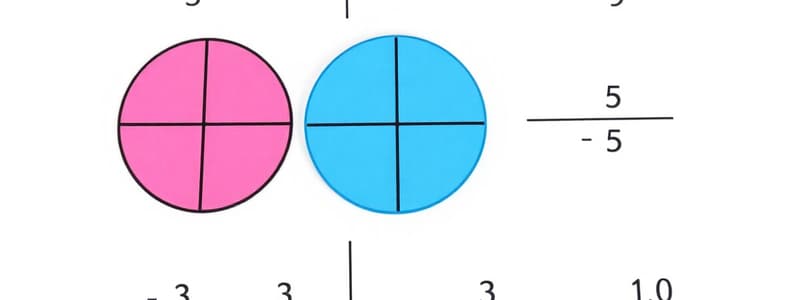Podcast
Questions and Answers
Which of the following correctly describes an operation that can be performed with fractions?
Which of the following correctly describes an operation that can be performed with fractions?
- Fractions cannot be added or subtracted.
- Fractions can only be multiplied with whole numbers.
- Fractions can only be divided into whole numbers.
- Fractions can be added, subtracted, multiplied, or divided. (correct)
What is an essential property of fractions when performing operations?
What is an essential property of fractions when performing operations?
- Fractions can only be simplified by multiplying both the numerator and the denominator.
- Fractions must always have the same denominator for addition and subtraction. (correct)
- The denominator must always be smaller than the numerator.
- The operations do not affect the value of the fraction.
Which operation is NOT valid when working with fractions?
Which operation is NOT valid when working with fractions?
- Dividing fractions by whole numbers
- Multiplying fractions with different values
- Subtracting fractions with common denominators
- Adding fractions with unlike denominators (correct)
What happens to a fraction when you multiply both its numerator and denominator by the same non-zero number?
What happens to a fraction when you multiply both its numerator and denominator by the same non-zero number?
When simplifying a fraction, what is the purpose of dividing both the numerator and the denominator by their greatest common divisor?
When simplifying a fraction, what is the purpose of dividing both the numerator and the denominator by their greatest common divisor?
Flashcards are hidden until you start studying
Study Notes
Operations with Fractions
- Fractions can be added, subtracted, multiplied, and divided.
Essential Property of Fractions
- The essential property of fractions is that the value of the fraction remains the same when both the numerator and denominator are multiplied or divided by the same nonzero number.
Invalid Operation
- Division by zero is not a valid operation in fractions, or any other mathematical operation.
Multiplying Numerator & Denominator
- Multiplying both the numerator and denominator of a fraction by the same nonzero number results in an equivalent fraction. The equivalent fraction represents the same value as the original fraction.
Purpose of Simplifying Fractions
- When simplifying a fraction, dividing both the numerator and denominator by their greatest common divisor reduces the fraction to its simplest form. This simplified form is equivalent to the original fraction but is expressed with the smallest possible integers.
Studying That Suits You
Use AI to generate personalized quizzes and flashcards to suit your learning preferences.





